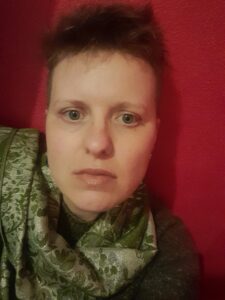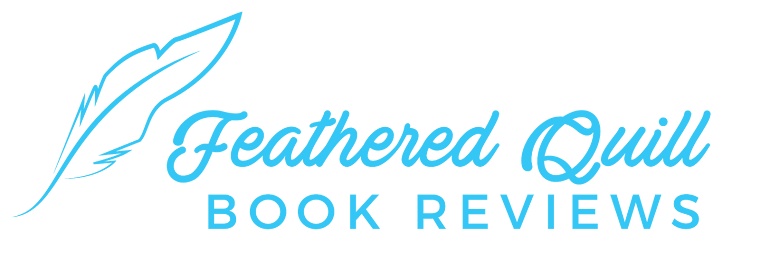Today, Feathered Quill reviewer Lynette Latzko is talking with Kathryn Lund, author of The Things We Left Sleeping
FQ: What inspired you to write The Things We Left Sleeping, and specifically to write it in two alternating narratives?
LUND: I began writing The Things We Left Sleeping as part of my MA in Creative Writing at Oxford Brookes. We were looking at how you can use and create different voices within your writing and how these voices can link to ideas of identity and aesthetics.
When I was twenty-four I lost my mum within six weeks of a cancer diagnosis. Not long after that I began to experience strange neurological symptoms. I would have no memory of watching or reading things I knew well; I would find time slipping or running in different speeds inside and outside of my head. The headaches I started developing at university became more frequent and my tendency to get stuck saying words began to worsen. Then I had a series of seizures and began a long struggle with my neurological health. These two things – a sudden and painful death and the loss of control over my own mind – had a profound impact on my ideas of who I was. My identity changed. I was no longer a ferociously independent, academically driven achiever. I was an incapacitated dependant who struggled to remember faces, to know when she was awake or dreaming, to relate to time structures such as days or hours, to carry a cup across a room. It changed how I understood myself. Several years into this struggle I was having an utterly awful day, and, with nothing else to do, I sat down and wrote a short story. I entered it into a small competition and won. I realised that although I had lost all else about myself I had not lost my ability or my compulsion to write. When I was then faced with the task of exploring identity through a unique voice it seemed obvious to me that I should use my own experiences. To take it as an opportunity to try and translate onto the page how language, words and writing had come back to me and helped me build a way out of difficult places.
This idea developed into the ‘Evie’ side of the narrative, a place where a mind comes back from blankness, from a literal empty page, to a sense an understanding of itself. The second narrative, the Stevie side, then provides the world outside of the mind, showing how trauma splinters out into the wider world, beyond the moments of that trauma. It also provides the necessary action in what would otherwise be a wholly reflective piece. So where Evie is in her mind, Stevie is all about her body; where Evie is reflective, Stevie is pro-active. It shows how healing is something that is done between people as well as on your own.
FQ: Are the characters Evie and Stevie based on anyone?
LUND: Evie and Stevie are both part of me. Evie is made out of my experiences with a neurological disorder and mental health battles. She shares a lot of my medical history: she is my way of explaining what it is like inside my head. Stevie is my confidence: she is the girl that, though she got knocked down, does eventually come back.
Beyond that, though, they are completely original people in their own right. Evie has some of my memories and Stevie looks like someone I once knew but they are also uniquely themselves and parts of them are quite independent from me. So though Evie’s family has lost a mother it is not my family; it has no sister like I do, no nieces and nephew. Stevie’s background is dangerous, mine is safe. It is perhaps easiest to say that they began as parts of me and then grew into separate people.
FQ: What one thing would you like readers to gain from reading this book?

LUND: I wanted to write a book that asked the reader to struggle because I struggle. If it takes you a while to orientate yourself in the text, to know what you are supposed to do, how you are meant to respond, then imagine that is what you must do each day of your life. I want the reader to gain that sense of struggle by experience in the hope that it stays with them far more than me repeatedly saying that I struggle.
FQ: Experiencing trauma can be extremely detrimental to mental health. Writing or journaling is often suggested by mental health professionals to work through the event and assist in the healing process. How has writing this story helped you in your life, and with your own trauma?
LUND: One of the hardest things about developing a neurological condition is that you have to explain what is wrong with your brain by using your brain. I found it far easier to explain it to a blank page than to a person. A blank page lets you go out in any direction; your understanding of what is happening to you doesn’t have to be linear. It can be a word, a picture, a sentence. Oddly, the emptiness of the page gave me a structure, something which my brain now sometimes struggles with.
It also gave me somewhere to preserve something of my mum. The character of Linda in the book is not my mum but she was a place to share something of her and the experience of losing her. So the way in which Evie’s parents Linda and Dave met is actually my parents’ love story. The scene where Evie’s family is standing around the piano is built on my memories of my mum playing as I went to sleep or how my sister and I would play with her on various instruments and sing. It gave me somewhere to keep her safe and that helped.
FQ: What was the most difficult part about writing this story?
LUND: The most difficult part was striking the correct balance. I wanted the book to challenge the reader and ask them to work hard but at the same time it had to make them want to meet the challenge and keep reading. It also needed to have a good balance between the fantastical, internal parts and the practical, external ones. Fortunately I had lots of great feedback in the early drafting and development stages, from my agent at the time Chris Wellbelove, from my writing mentor Steven Hall (The Raw Shark Texts) and from the brilliant staff at the Oxford Brookes Creative Writing MA. The stories then had to balance across the physical book but this was actually a helpful challenge as it ensured that the narratives moved together and that the premise that the two characters were journeying together, towards each other, was reflected on the actual pages.
FQ: On your website, you briefly mention neurodivergence, and being neurologically different. How has this both positively and negatively affected your writing?
LUND: It is far easier for me to think of the negatives than the positives because the negatives can seem huge and overwhelming. I struggle with screens, with lights and environments and this has a huge impact on how and when I can write. When you are in pain or recovering from it, and when energy is limited, it can be difficult to justify giving it to writing rather than, say, staying clean or making sure you eat. Sharing your work at poetry and open mic nights is difficult when the wrong light bulb can give you migraines. Mental illness struggles such as anxiety can be overwhelming, making tiny tasks seem huge. But there are positives, mainly that a different neurology leads to a different way of thinking. When you are turned sideways to the world you get a different perspective.
FQ: I love how you describe your other work, The Things We Keep in the Cupboard, as “...a collection of four short stories which reflect on lives not quite lived.” Would you tell our readers a bit about the book and the background to how it came to be?
LUND: I think a lot of people find the idea of how their life could have gone under different circumstances slightly fascinating. If my mum hadn’t died, if I hadn’t developed neurological problems, I would have completed my PGCE and be working in museum education. If I had revised better, or at all, for my A levels I would have gone to a completely different university for a completely different course. If I hadn’t… If I’d only… It’s a concept I struggled a lot with when learning to manage my illness, especially from a mental health point of view. I felt like what had happened had pushed me off the life I was meant to have and away from the person I had happily become. The four short stories in The Things We Keep in the Cupboard are all about lives that could have gone in a different direction. At the same time they explore other aspects of my mental health struggles, such as OCD, suicide and depression. That said, I hope they are actually quite positive stories, positive in that they come from facing up to and exploring these issues.
FQ: Who are your favorite authors and have they had any influence on your writing?
LUND: If I could only save the work of one author without a doubt it would be Terry Pratchett. He showed me that you can believe you are reading one thing, such as a comedy fantasy, and actually find that you are reading something else, like the most heart-breaking insight into people and society. He was a satirist and social commentator; he gave us Sam Vimes and Esme Weatherwax and he told us to “open our eyes and open them again.”
He was also the first author I had ever read who didn’t bother with chapters, he let you decide where the right place was for you to pick up and put down the story. You take the break in Terry Pratchett where you need to take it and I loved that, still do. I think reading him from when I was a teenager helped me to start to question structure and voice. His footnotes for example are brilliant, like having a second narrator who occasionally pops up to either agree with how silly something is or to make it more absurd.
I also avidly read Dorothy L. Sayers, the Ed MacBain 87th Precinct novels, Ysra Sigurdardόttir. Every book I read influences my writing because the more voices we hear the more we realise what parts of the conversation we want to take part in and what parts are missing and what we want to say.
FQ: Do you have any future writing plans?
LUND: I have a YA novel that I would love to find a home for. I also have lots of poems from my MA and I would like to get back into the habit of writing them. Poetry is like working out, you get better and feel better the more you do it but it can be quite hard to re-start. For the moment though I’d really like to concentrate on getting The Things We Left Sleeping out there. Writing is talking into an empty room, it’s only when the book is finally out there that you get to hear the other half of the conversation. It’s rather daunting but I’d like to hear it.

No comments:
Post a Comment